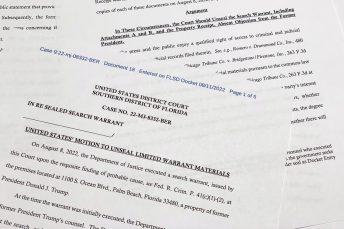In early August of this year, the FBI searched the Mar-a-Lago home of former president Donald Trump. After years of contact between Trump and the Federal Government, including formal requests and subpoenas, the FBI obtained a warrant to search the 126-room, 62,500 square foot mansion. They were looking for documents that Trump had allegedly after his presidency. This article will serve as a summary of what happened and how the story developed.

The Presidential Records Act (PRA) of 1978 was passed in an effort to preserve the history and record of each president even after they left the office. It mandates the full preservation of all presidential records, including those of the Vice-President. The Act also changed the ownership of these records from private to public, meaning that the people of the United States would be able to view them at any time. The PRA was enacted after the Watergate scandal and subsequent resignation of Richard Nixon in 1974. Nixon had attempted to destroy the documents relating to the scandal, as at the time they were considered private property and had few restrictions. The preservation of these records allows us to view history through a more objective lens, rather than be beholden to cover-ups and retconning.

President Trump has been accused of keeping boxes of these classified documents well past their release date. While he did release a number of boxes and documents before the raid, he was still holding some back, which the FBI did obtain at Mar-a-Lago. The raid itself, which caused an uproar among Trump supporters and praise among his opponents, was seen as a major escalation in the investigation. This was the first time a former president’s place of residence was raided in connection to a criminal investigation.

A few weeks after the raid, Trump filed a federal lawsuit against the FBI in order to obtain a “special master” to oversee the investigation. This is essentially a third-party attorney that is appointed by a court to oversee a specific part of a criminal investigation, usually one where improper handling of evidence could shift the verdict one way or the other. This didn’t come as a surprise, as special masters are a standard legal procedure in high-profile cases.
Shortly after Trump filed his lawsuit, Aileen Cannon—the federal judge presiding over this case—said that she would likely grant Trump his special master. On September 5th, she did just that. Cannon said that “the special master will have the power to look for documents covered under attorney-client privilege and executive privilege.” This outcome is a big win for Trump, who has been banking on this ruling since early August.

The special master was officially appointed on Thursday September 15th, with Judge Cannon naming Raymond J. Dearie, a senior U.S. district judge for the Eastern District of New York. Cannon said in the statement that “The Court does not find it appropriate to accept the Government’s conclusions on these important and disputed issues without further review by a neutral third party in an expedited and orderly fashion.” According to Zoë Richards of NBC, it is likely that the government will appeal this ruling, as they did the same thing when the approval of a special master was ruled upon back in early September.
Expectedly, the raid itself and everything surrounding it has been highly politicized. Sharp partisan lines have been drawn, with those on the right supporting Trump and those on the left supporting the Justice Department. Glenn S. Gerstell, the general counsel for the NSA from 2015 to 2020, says that this could have the unwanted effect of disrupting the final verdict, as well as distracting us from the real problems this situation reveals. Gerstell says that in order “To protect our national security, we need to take politics out of the Mar-a-Lago documents case.” For Gerstell, this means right-wingers stepping down from their automatic defense of Trump and leftists refraining from jumping to conclusions about guilt and intentions. According to him, “we still don’t know exactly what was in those documents, and key elements of criminal culpability.”

Gerstell’s time as the General Counsel of the National Security Agency and Central Security Service spanned both the Obama and Trump administrations.
Gerstell does make one thing clear: the careless handling of these documents could put our troops, our agents, and even the common American citizen in danger. Gerstell claims, “Those papers could reveal identities of CIA sources or FBI informants, information about how our spy agencies conduct electronic surveillance on foreign adversaries, details of past or future covert operations against foreign terrorists, reports on secret military technologies, or even battle plans for how the United States might react to, say, the launch of a North Korean missile.” Gerstell emphasizes the efforts of Russia, China, and other nations to undermine American security. In fact, according to Gerstell, during Trump’s presidency, “two Chinese nationals were apprehended at Mar-a-Lago for unauthorized entry. One had five cell phone SIM cards, cameras, nine thumb drives and thousands of dollars in cash.” While these two were arrested and later deported back to China, it clearly shows how easy it is for foreign countries to take advantage of our carelessness. While Gerstell doesn’t believe Trump’s intentions were malicious, he condemns his actions as “careless” and posing a “risk” to our covert agents in the field. Regardless of the intention behind the documents, Gerstell says it’s clear that the act of removing them from the classified areas was a blunder, and the investigators must be very careful in exactly what information is revealed to the public. While it may be tempting to release and read everything that Trump took, doing so would have disastrous consequences for the very organizations that work hard to keep the country safe.





'What Happened at Mar-a-Lago?' has no comments
Be the first to comment this post!